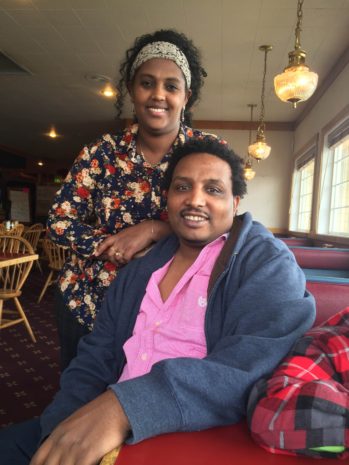Ethiopian Refugee and Business Owner Is Grateful for Welcoming Idahoans
Date: May 23, 2016

Kibrom Milash and wife, Tirhas.
In April 2015, Kibrom Milash opened Kibrom, one of Boise, Idaho’s few Ethiopian restaurants. It was part of the Boise International Market, a place where customers could buy food and products from countries around the world. A fire gutted the market the following September, but Milash wasn’t deterred. In February 2016, he re-opened the restaurant in another part of Boise and quickly regained his loyal customer following.
Overcoming obstacles is a common theme in Milash’s life. He spent most of his young adulthood in Eritrea, a country known for its fierce repression and poor wages. As a middle school math teacher, he earned just $3 a month. When he asked to be paid a living wage, he was jailed. Upon his release, he crossed the border into Ethiopia, where he spent five years in a refugee camp. There, without electricity, Milash operated a makeshift restaurant. It was his dream, he says, to open a restaurant in the United States.
In May 2013, the door to that possibility opened when and his wife and two sons were allowed to come to the United States as refugees. They settled in Boise, where Milash took two jobs — one as a janitor and one as a cook — before finally opening Kibrom. Today, the restaurant’s revenue is about $25,000 a month, he says, and he employs five people. He and his wife work six days a week, from 8 a.m. until 11 p.m.
One of the greatest parts of running the restaurant, he says, has been introducing Idahoans to his native cuisine. “Boise people didn’t know about injera, our high protein bread,” he says. “It’s really good bread and people tell me how much they love it. The mix of cultures is a good thing.”
The freedom, we cherish that. People want to make something of themselves, and the United States lets them.
Immigrants and refugees, he says, are hard working, so reform that “allows people to come [to the United States] is positive for everyone.” He has seen how immigrants from countries with profound economic and political hardship seize on opportunities. “The freedom, we cherish that,” he says. “People want to make something of themselves, and the United States lets them.” Simple things, like having a dependable source of electricity, is huge, Kibrom says. To Americans, that’s a basic service. To Kibrom, it’s a reason to make significant contributions to his adopted home.
He also has found that Idahoans are supportive of refugee and immigrant entrepreneurs. He was struck by the outpouring of support for him and other foreign-born business owners after the fire. “They raised $55,000 for us in a Kickstarter campaign,” he says. “That shows why I love Boise and the people here.”
